How to Create a Skincare Routine That Works#COMMA
If you're like 50% of people who struggle to find an effective skincare routine, you're not alone. Understanding your skin's unique needs is crucial, but where do you begin? By following a few key steps, you can unlock the secret to a skincare routine that truly works for you. By addressing specific skin concerns, choosing the right products, and establishing a consistent routine, you'll be on your way to achieving healthy, glowing skin. But there's more to it than just that – are you ready to discover the key to unlocking your skin's full potential?
Key Takeaways
- Determine skin type and concerns for tailored routine.
- Research and select products suited to your needs.
- Patch test new products and follow usage instructions.
- Establish consistent morning and evening routines.
Skin Assessment
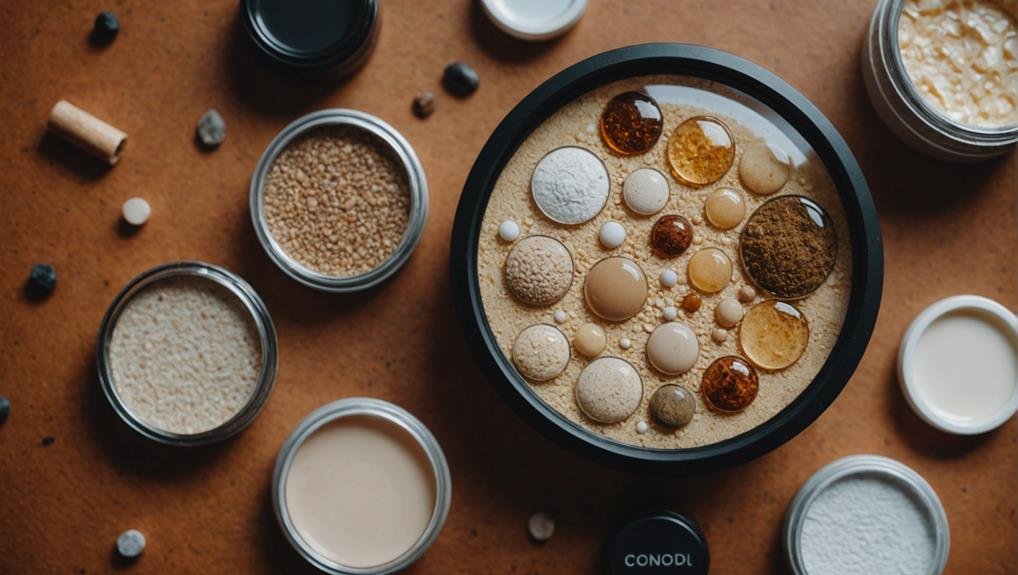
Before beginning your skincare routine, it's essential to conduct a thorough skin assessment to understand your specific skin type and concerns. Identifying your skin type, whether it's oily, dry, combination, or sensitive, is crucial as it determines the products and ingredients that will work best for you.
Professional assessments by dermatologists or estheticians can provide valuable insights, but a DIY approach can also be effective. Begin by observing how your skin feels throughout the day, noting any oiliness, dryness, or irritation. Look closely at your pores, texture, and any visible concerns like acne or redness.
Consider factors like age, lifestyle, and environmental influences that can impact your skin. By taking the time to assess your skin thoroughly, you can tailor your skincare routine to address your specific needs and achieve healthy, glowing skin.
Identify Skin Concerns
Conducting a comprehensive analysis of your skin's condition is crucial in identifying specific concerns that need to be addressed in your skincare routine. Understanding your skin type is the first step in this process. Whether you have oily, dry, combination, sensitive, or normal skin, recognizing your skin type helps tailor your skincare routine to meet its unique needs.
Next, pinpoint your problem areas. These could include concerns like acne, fine lines, wrinkles, hyperpigmentation, redness, or dry patches. By identifying these specific issues, you can select products and treatments that target and improve these areas effectively.
Once you have a clear understanding of your skin type and problem areas, you can begin to research and select products that are suitable for your specific concerns. This personalized approach ensures that your skincare routine is tailored to address your skin's individual needs, leading to healthier and more radiant skin over time.
Research Products
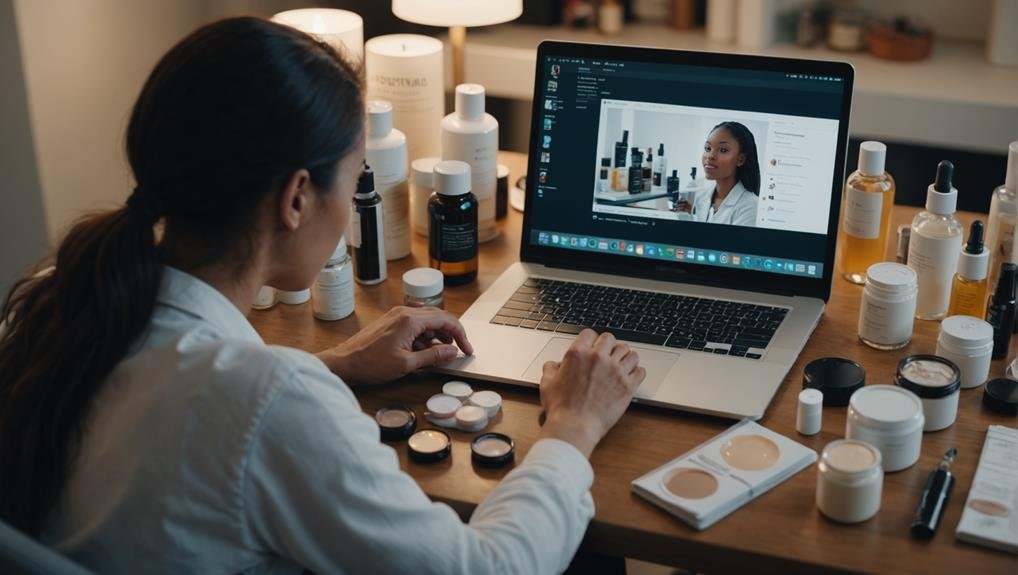
Begin your skincare routine by thoroughly researching products that are tailored to address your specific skin concerns and needs. Conduct an ingredient analysis to ensure the chosen products contain active components that target your skin issues effectively.
Additionally, consider your budget carefully to strike a balance between quality and affordability. Look into reputable brands known for their skincare expertise and commitment to using high-quality ingredients. Reading customer reviews can provide valuable insights into how products perform in real-life scenarios, helping you make informed decisions.
When researching products, prioritize those with ingredients known to benefit your skin type. Look for scientific evidence supporting the effectiveness of these ingredients in addressing your concerns. Consider seeking advice from skincare professionals or dermatologists for personalized recommendations that align with your skin goals and concerns.
Patch Test New Products
To ensure compatibility and minimize the risk of adverse reactions, it's essential to patch test new skincare products on a small area of your skin before incorporating them into your routine.
Product allergies can manifest as redness, itching, or even swelling. Follow these steps to safely introduce new products:
- Choose a Small Test Area: Opt for a discreet spot like the inner forearm or behind the ear to conduct your patch test.
- Apply a Small Amount: Use a small amount of the product on the selected area and wait for 24 hours.
- Observe for Reactions: Look out for any signs of sensitivity or allergic reactions such as redness, bumps, or itchiness.
- Monitor Multiple Times: Check the test area multiple times within the 24-hour period; if you notice any adverse reactions, refrain from using the product on your face.
Taking the time to test new products can prevent potential issues and ensure your skincare routine is tailored to your skin's needs.
Cleanse Properly
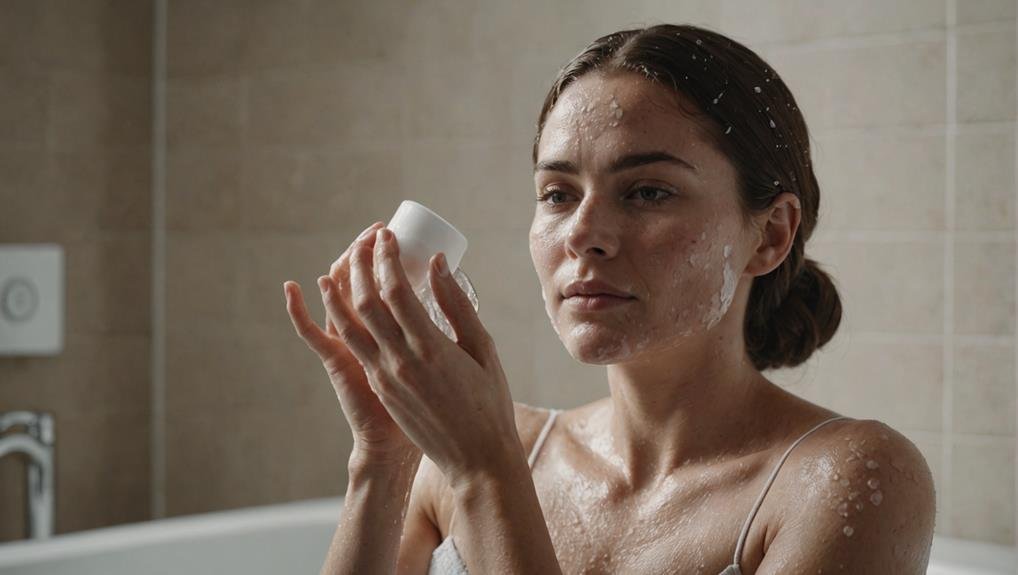
For effective skincare, it is crucial to cleanse your skin properly to remove impurities and maintain a healthy complexion. Cleansing techniques play a vital role in your skincare routine. Consider your skin type when choosing products to ensure they are suitable for your specific needs. Double cleansing, which involves using an oil-based cleanser followed by a water-based one, can deeply clean your skin and remove all traces of makeup and dirt. Here are some product recommendations and benefits of double cleansing:
| Cleansing Technique | Product Recommendations | Skin Type Considerations |
|---|---|---|
| Oil Cleansing | The Face Shop Rice Water Bright Cleansing Oil, DHC Deep Cleansing Oil | Suitable for dry and sensitive skin |
| Water-Based Cleansing | CeraVe Hydrating Facial Cleanser, La Roche-Posay Toleriane Hydrating Gentle Cleanser | Ideal for oily and acne-prone skin |
| Double Cleansing | Banila Co Clean It Zero, Simple Kind to Skin Hydrating Cleansing Oil | Great for all skin types, especially for thorough cleansing and removing makeup |
Incorporating these techniques and products into your routine can help you achieve a clean and refreshed complexion.
Exfoliate Regularly
Regular exfoliation is essential for maintaining healthy skin by removing dead skin cells and promoting cell turnover. To effectively incorporate exfoliation into your skincare routine, follow these key tips:
- Exfoliate gently, avoid over exfoliation: Over exfoliating can lead to skin irritation and damage. Opt for gentle exfoliants with round beads or chemical exfoliants like AHAs or BHAs for a milder approach.
- Choose exfoliating products wisely, consider skin type: Different skin types require different exfoliation methods. If you have sensitive skin, opt for mild exfoliants like lactic acid. For oily skin, consider salicylic acid to unclog pores effectively.
- Frequency matters: Find a balance in how often you exfoliate. For most skin types, exfoliating 2-3 times a week is sufficient. Adjust based on how your skin responds.
- Sun protection is non-negotiable: Exfoliation can make your skin more sensitive to the sun. Always apply sunscreen during the day to protect your skin from harmful UV rays and prevent any damage.
Moisturize Daily
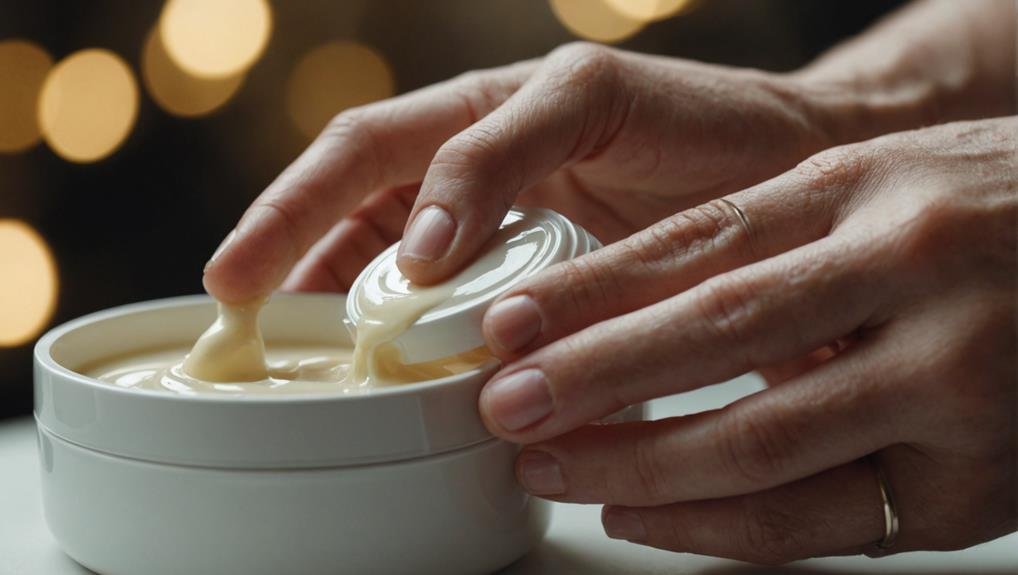
Ensure your skin stays hydrated and healthy by incorporating daily moisturization into your skincare routine. Maintaining a proper hydration balance is essential for glowing and youthful skin.
When selecting a moisturizer, consider your skin type and concerns. For dry skin, opt for rich, hydrating creams, while those with oily skin may benefit from lightweight, oil-free formulas.
In the morning, apply a moisturizer with SPF to protect your skin from harmful UV rays. Look for products that offer broad-spectrum protection to shield against both UVA and UVB rays.
For your nighttime routine, choose a nourishing night cream to help repair and rejuvenate your skin while you sleep. Ingredients like hyaluronic acid, glycerin, and ceramides can boost hydration and strengthen the skin's barrier.
Use Sunscreen
Have you ever wondered why sunscreen is crucial for your skincare routine? Sunscreen application isn't just for sunny days; it should be a daily habit to protect your skin from harmful UV rays. Here's why SPF protection is a non-negotiable step in your skincare regimen:
- Prevents Premature Aging: Sunscreen helps prevent wrinkles, fine lines, and age spots caused by sun damage, keeping your skin looking youthful.
- Reduces Skin Cancer Risk: Regular use of sunscreen lowers the risk of skin cancer, including melanoma, the deadliest form of skin cancer.
- Maintains Even Skin Tone: SPF protection helps prevent hyperpigmentation, ensuring an even complexion and reducing the appearance of dark spots.
- Preserves Skin Elasticity: UV rays can break down collagen and elastin, leading to sagging skin. Using sunscreen helps maintain skin's firmness and elasticity.
Target Treatments
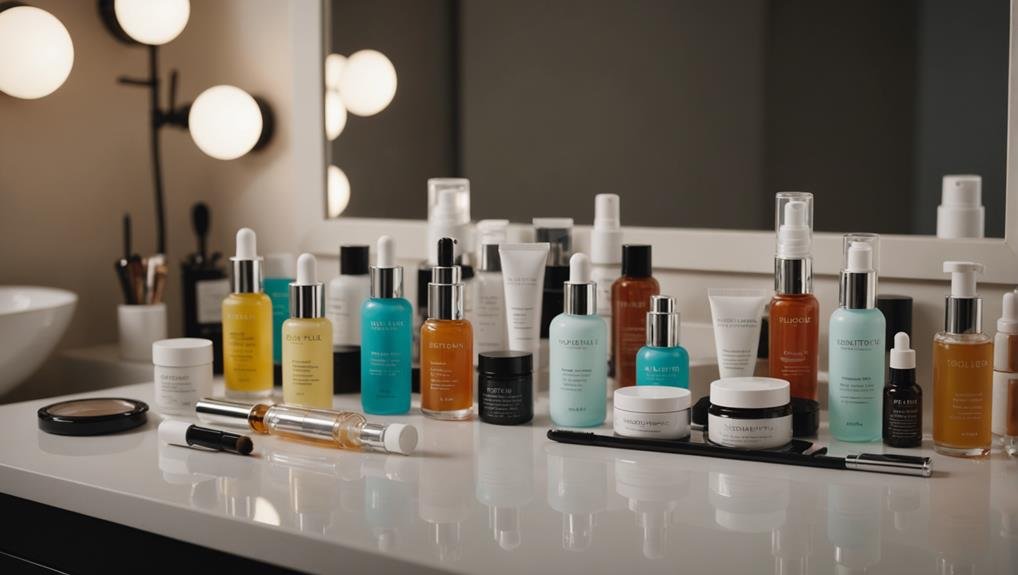
Implementing targeted treatments in your skincare routine can address specific skin concerns effectively and efficiently. Targeted serums are potent formulations designed to penetrate deeply into the skin, delivering concentrated active ingredients to tackle issues like fine lines, dark spots, or dehydration.
Incorporating specialized masks into your routine can provide intensive nourishment, hydration, or brightening effects, depending on your skin's needs.
For more localized concerns such as acne breakouts or pesky blemishes, spot treatments offer a focused approach to help clear up problem areas quickly. These treatments often contain ingredients like benzoyl peroxide or salicylic acid known for their acne-fighting properties. By applying them directly onto the affected areas, you can speed up the healing process and prevent further breakouts.
Remember that consistency is key when using targeted treatments. Integrate them into your skincare routine as needed, following the instructions provided to achieve the best results.
Establish Routine
To optimize the effectiveness of your skincare regimen, establishing a consistent routine is paramount. Developing a routine tailored to your skin's needs can make a significant difference in achieving your desired results. Here are some key aspects to consider when establishing your skincare routine:
1. Morning versus Evening Routines:
Understand the different purposes of your morning and evening routines. Morning routines focus on protection and hydration, while evening routines emphasize repair and rejuvenation.
2. Product Layering Techniques:
Follow the correct order when layering your skincare products to ensure maximum absorption and efficacy. Start with the thinnest consistency and build up to thicker products.
3. Consistency is Key:
Stick to your routine consistently to allow the active ingredients in your products to work effectively. Results often take time, so be patient and committed to your regimen.
4. Adjust as Needed:
Be attentive to your skin's response and adjust your routine accordingly. If a product is causing irritation or not delivering results, consider making changes to optimize your skincare routine.
Monitor and Adjust

To ensure optimal results from your skincare routine, it's essential to regularly monitor your skin's response to the products and make adjustments as needed. Tracking progress allows you to see what's working well and where improvements are necessary.
If you notice any adverse reactions or lack of improvement, it's time to adjust accordingly. Seeking professional advice can provide valuable insights into your skin's needs. Dermatologists or skincare specialists can help assess your current routine, identify potential issues, and suggest modifications.
Updating your routine based on their recommendations can lead to better outcomes.
Consistency Is Key
Maintaining consistent application of your skincare products is crucial for achieving optimal results and promoting skin health. Your skin type plays a significant role in determining the effectiveness of your skincare routine. Different skin types require specific ingredients and formulations to address their unique needs. Understanding your skin type allows you to tailor your routine for maximum benefits.
Product compatibility is another essential factor in maintaining consistency. Using products that work well together enhances their efficacy and prevents adverse reactions. It's important to research and ensure that the products in your routine complement each other to avoid any potential conflicts.
To achieve the best results, establish a daily skincare routine and stick to it. Consistency allows the active ingredients in your products to work effectively over time. Skipping steps or being irregular in your routine can hinder progress and lead to subpar outcomes.
Frequently Asked Questions
Can I Skip Moisturizing if My Skin Feels Oily?
If your skin feels oily, it's tempting to skip moisturizing, but that's a myth. Hydration is crucial even for oily skin concerns. Opt for a lightweight, oil-free moisturizer to maintain balance and keep your skin healthy.
How Often Should I Replace My Skincare Products?
To maintain your skin's glow, remember this: skincare products are like fresh flowers, blooming beautifully but not forever. Replace them according to their expiration dates or shelf life to ensure effectiveness.
Is It Necessary to Use Separate Sunscreen for the Face?
You should use a separate sunscreen for your face. Sunscreen application is crucial for protecting your facial skin from sun damage. Incorporating this step into your skincare routine will ensure proper sun protection and maintain healthy skin.
Can I Mix Different Skincare Brands in My Routine?
You should be cautious when mixing different skincare brands in your routine. Brand compatibility and ingredient effectiveness could be affected. Consistency in product layering is key for optimal skincare results. Stick to one brand for better outcomes.
What Should I Do if My Skin Reacts Negatively to a Product?
If your skin reacts negatively to a product, prioritize calming ingredients like aloe or chamomile. Conduct a patch test before trying new products. Analyze ingredients to pinpoint irritants. Consider alternative products to maintain your skincare routine without compromising skin sensitivity.
Conclusion
In conclusion, maintaining a successful skincare routine involves understanding your skin's unique needs, researching suitable products, and being consistent with your regimen.
By identifying and addressing specific concerns, cleansing effectively, and monitoring your skin's response, you can achieve healthy, glowing skin.
Remember, consistency is key to seeing long-lasting results and maintaining a radiant complexion.
Keep up the good work and enjoy the benefits of a skincare routine that works for you.





